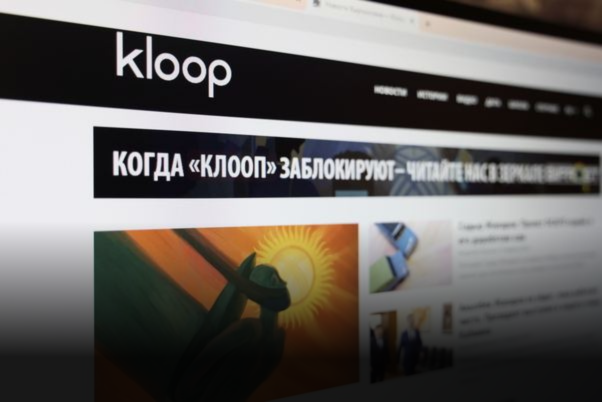Kloop Media, a leading independent media organization in Kyrgyzstan, is currently facing a lawsuit to shut it down, initiated on August 22 by the Kyrgyzstani authorities due to its journalistic activities. Although Kloop is determined to survive, this is yet another serious blow against freedom of expression in Kyrgyzstan.
In the lawsuit, Kloop is accused of “manipulating“ public opinion and “causing harm” to public health and well-being, including accusations that the organization caused people to experience a wide array of negative emotions and psychological disorders, “sexual anomalies”, and suicidal tendencies, claims that Kloop calls absurd. The Bishkek prosecutor’s office, which filed the lawsuit, accuses Kloop is of “zombifying” the Kyrgyzstani population.
According to the lawsuit, Kloop is not registered as a media outlet - although that is not required by the law - and for allegedly carrying out activities to disseminate information not covered by its charter. The trial to hear the lawsuit against Kloop is set to take place on 26 September 2023. On 8 September, the Ministry of Culture ordered Kloop’s website to be blocked for allegedly spreading false information, in response to an article Kloop published a week earlier on the alleged torture of a policial prisoner.
The latest developments involving Kloop are part of a growing wave of pressure against media outlets, online platforms, journalists, bloggers, and activists who challenge the official narrative. Earlier high-profile cases include those of journalist Bolot Temirov, who was deported to Russia because of his investigations on corruption, and Azattyk (the local service of Radio Free Europe/Radio Liberty), which had its site blocked and was closed down by court because of an article about hostilities at the border with Tajikistan, a decision that was later reversed.
In the 15 years since its founding, Kloop has repeatedly been subjected to intimidation and harassment because of its independent and investigative reporting. In particular, it faced a defamation lawsuit that could have resulted in its bankruptcy following the publication of a joint investigation with Azattyk, Bellingcat, and Organized Crime and Corruption Reporting Project (OCCRP), which revealed a multi-million dollar corruption scheme centred around ex-top customs official Raimbek Matraimov. Matraimov eventually dropped the lawsuit.
This is, however, the first time that the authorities are directly trying to shut down Kloop. In addition to requesting its closure, the authorities revealed that the State Committee for National Security (GKNB) had initiated a criminal investigation against the media in November 2021 for Kloop allegedly publicly calling for the seizure of power, a criminal offence punishable with up to five years in prison. While details about the latter case are scant, it could have serious implications for individual journalists at Kloop. Both local media organizations and international human rights organizations, including International Partnership for Human Rights (IPHR), have expressed support for Kloop and condemned the actions of the Kyrgyzstani authorities against it.
Because of the recent developments, including the initiative to shut down Kloop, Kyrgyzstan’s reputation as a country that is more tolerant of dissent and freedom of expression than its neighbors is rapidly evaporating. In just one year, Kyrgyzstan plummeted as much as 50 places in Reporters Without Borders’ annual press freedom ranking. Last year, Kyrgyzstan ranked 72 out of 180 globally. This year, its rating has fallen to a shocking 122 out of 180.
‘Zombification’ of Kyrgyzstan
The accusation lodged against Kloop, according to which it allegedly "zombifies’’ people, brings to mind one of the most esteemed and cherished Kyrgyz writers: Chinghiz Aitmatov. Aitmatov also experienced censorship against his writing in Soviet times, although he was remarkably allowed to publish honest socialist realist texts which contained criticism of the regime. Aitmatov addressed existential and controversial political themes, touching on the lives of people in Soviet Central Asia and how they were hindered and controlled by the political center, far away in Moscow.
In his famous 1980 novel “The Day Lasts More Than a Hundred Years”, Aitmatov coined the term “mankurt” - a fictional legend about prisoners of war who were “zombified” through gruesome torture: by having camel skins wrapped around their heads, and being left in the hot sun to dry. As the skins dried, they shrunk like a steel band, thereby leaving the prisoner a “mankurt”, a zombified version; "a mankurt did not recognize himself as a human being".
Today, the expression is used mostly to refer to people who have lost or forgotten their national identity, as a direct result of Russian-Soviet colonialism that the Central Asian region experienced. Today, Kyrgyzstan is controlled by another elite, which has taken a series of measures reversing previous important progress made towards democratization and human rights protection during Kyrgyzstan’s 30 years of independence. Kloop is neither the ‘’zombifier’’, nor the shrinking camel skin. Kloop, along with the other independent media in Kyrgyzstan and Central Asia, represents the scissors that cuts the mind free from central government control, and fosters an open a pluralist dialogue.
The Kyrgyzstani authorities should know that freedom of expression is a fundamental pillar in the building of a healthy, democratic state and they should stop persecuting Kloop and others who help promote public awareness, discussion, and participation on issues of common interest to people in the country.
Alva Omarova is a researcher for International Partnership for Human Rights. IPHR is an independent, non-governmental organization founded in 2008. Based in Brussels, IPHR works closely together with civil society groups from different countries to raise human rights concerns at the international level and promote respect for the rights of vulnerable communities. See more at: https://www.iphronline.org/en/
Читайте на русском здесь.
Поддержите журналистику, которой доверяют.








